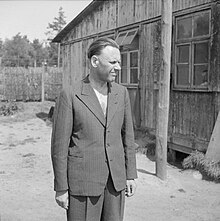Alexander Piorkowski

Alexander Bernhard Hans Piorkowski, also known as Alex Piorkowski (11 October 1904 – 22 October 1948 in Landsberg am Lech) was a German SS functionary during the Nazi era and commandant of Dachau concentration camp. Following the war, he was convicted and executed.
Life
Alexander Piorkowski was a trained mechanic who worked as a traveling merchant in the 1920s.
He joined the SA on 1 June 1929 and moved from there to the SS on 1 June 1933 (member no. 8,737). On 1 November 1929, Piorkowski became a member of the Nazi Party (member no. 161,437). He first led the SS-Standarte in Bremen from 20 July 1935, and in the following year, the SS-Standarte Allenstein. For health reasons, he retired from the service on 19 September 1936.[1]
From July 1937 to December 1937, Piorkowski was provisionally commandant of Lichtenburg concentration camp, and after its conversion into a women's concentration camp, deputy to Lagerdirektor Günther Tamaschke until August 1938.[2] From there he was transferred to the Dachau concentration camp in early August 1938, where he served as Schutzhaftlagerführer. From February 1940 to mid-September 1942, he was the commandant of Dachau concentration camp. Due to corruption charges, he was discharged from service on 31 August 1943.[1]
After the Second World War, Piorkowski, along with his adjutant Heinrich Detmers, had to answer to a U.S. military tribunal at the Dachau trials from 6 to 17 January 1947. The charges were crimes against humanity, deportation, abduction and ill-treatment of prisoners in the former concentration camp at Dachau. Piorkowski was sentenced to death. He made futile petitions for a pardon. Alexander Piorkowski was hanged in the Landsberg Prison for war criminals.[3]
Bibliography
- Martin Gruner. Verurteilt in Dachau. Der Prozess gegen den KZ-Kommandanten Alex Piorkowski vor einem US-Militärgericht. Wißner-Verlag, Augsburg 2008, ISBN 978-3-89639-650-1
- Ernst Klee. Das Personenlexikon zum Dritten Reich: Wer war was vor und nach 1945. Fischer-Taschenbuch-Verlag, Frankfurt am Main 2007, ISBN 978-3-596-16048-8
- Stefan Hördler, Sigrid Jacobeit (Hrsg.). Dokumentations- und Gedenkort KZ Lichtenburg – Konzeption einer neuen Dauerausstellung für Werkstattgebäude und Bunker. Lit-Verlag, Berlin 2009, ISBN 978-3-643-10038-2
- Johannes Tuchel. Konzentrationslager: Organisationsgeschichte und Funktion der Inspektion der Konzentrationslager 1934–1938. (= Schriften des Bundesarchivs, Band 39). H. Boldt, 1991, ISBN 3-7646-1902-3
External links
- Recommendations for military trials at www.jewishvirtuallibrary.org (PDF-Datei; 1,98 MB)
References
- ^ a b Johannes Tuchel: Konzentrationslager: Organisationsgeschichte und Funktion der Inspektion der Konzentrationslager 1934–1938. 1991, p. 385
- ^ Stefan Hördler, Sigrid Jacobeit (Hrsg.): Dokumentations- und Gedenkort KZ Lichtenburg. Berlin 2009, p. 125f
- ^ This article contains a translation of the corresponding article in the German Wikipedia
